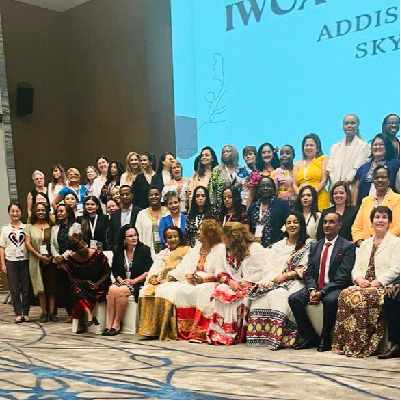
“It has been proven over the years what women could accomplish when their rights are respected; challenges are overcome as well as given equal opportunity. When they are given recognition for their contribution, they use their fullest potential to support not only their families but also their society and country as a whole.”
Addressing the Conference and Exhibition of the 20th Anniversary of the International Women Alliance of Coffee (IWCA), Convention in Ethiopia, held under the theme ‘20 Years of IWCA: Power of the Past & Force of The Future,’ Ergogie Tesfaye (PhD), Minister of Women and Social Affairs uttered the above remark.
Ethiopia is widely known to be the birthplace of coffee Arabica. The coffee is organic, which is demonstrated by its variety and quality of beans. Its coffee is grown in both highland and lowland conditions, nurtured with care by the farmers, garnering the beans a range of unique flavors and textures.
Coffee is an important cash crop and plays a crucial role both for the national GDP and in the livelihoods of millions of people. Over five million farmers make their living on this perennial crop. Approximately 20 million people deal, directly or indirectly, with the sector in transporting, trading, processing, roasting and exporting.
Despite the best accomplishment that the nation registered in creating a conducive environment for women economic beneficiaries, the Minister highlighted provision of loan, sustainable market linkage, working and display areas, technology, among others, remained a challenge for women manufacturers, entrepreneurs, as well as traders.
In this regard, the conference would be instrumental in showcasing the challenges opportunities and their efforts, strengthening their relationship, and sharing experiences. More importantly, it would allow promoting nation’s historical and traditional values in the coffee sector.
During the Conference and Exhibition which hosted representatives from 33 countries and held from October 16 to 22/2023, President of Women in Coffee Ethiopia (WiCE), Sara Yirga, mentioned on her part that the fact that the event is being held in the land of the origin of coffee Arabica has much more meaning to Ethiopians as well as to coffee producer and consumer countries.
In the view of its economic benefits, she said coffee does not only have an economic benefit to the country, but also has its own social values. It creates a very strong relationship among people. During the coffee ceremony, people share ideas, discuss how they resolve conflicts, how they made and better their business, talk about politics, charity activities etc.
“So I personally believe that it is appropriate to make this Conference in the homeland of coffee Arabica.”
Yet, the most significant reason is Ethiopia’s vast and suitable land for coffee plantation with excellent climate conducive for coffee. Its special varieties are least promoted and not marketed well.
As to her, close to 90 percent of the varieties of Arabica are found in Ethiopia and more varieties are expected to come to light as ongoing research undertakings indicate. Ethiopia expects to benefit more from coffee by increasing production and productivity and also by focusing more on agro-processing.
In this regard, the growing role of the private sector in the national economy at large and that of coffee sector in particular is very crucial. Moreover, the demand for coffee is likely to continue growing. This growth in coffee consumption presents a tremendous opportunity for coffee producing countries. On the other hand, the global coffee price has been declining since 2022, she added.
But surprisingly, Ethiopia earned more than 1.4 billion USD in 2022 and 1.33 billion USD in 2023. The reason behind this is due to the establishment of new reforms and the amended rules and regulations which in turn benefited our farmers and generated foreign currency for the country.
In addition to this, Sara reiterated they have given great attention to coffee quality and market penetration strategy in expanding destiny places also played a vital role.
Looking at the whole coffee value chain, she said the association sees women involved in every step, from tending to the plants to harvesting, processing, value addition, trading, exporting and so on. Without the participation of these women, the coffee that everyone relies on each morning would never reach us.
According to International Coffee Organization, between 20 percent and 30 percent of coffee farms are female-operated and up to 70 percent of labor in coffee production is provided by women, depending on the region.
Despite the vital role of female farmers, it is obvious that they continue to face inequality and obstacles to earning a decent living. Globally, women have less access to land, farming tools, seedlings, loans, and training. They are less likely to be able to join a cooperative or to rise through its ranks to a leadership position. As a result of these inequities, the average production on women-led farms can be up to 25% lower than on those led by men. That is why closing this gap is so important to all of us. That is why closing this gap is so important to all of us, Sara stressed.
“Empowering women in the economy and closing gender gaps in the world of work are key to achieving the 2030 Agenda for Sustainable Development and achieving the Sustainable Development Goals, particularly Goal 5, to achieve gender equality.”
In the context of the coffee industry, gender equality means good business focused on women economic empowerment and supporting activities to strengthen women. Therefore, everyone needs to do more to enable women to benefit from the coffee sector in a sustainable manner, as to her.
From the sustainable use point of view, it is necessary to understand the actual and practical situation of buyers. Global demand for coffee is growing as more people in traditionally tea-drinking countries, such as China and India, increase coffee consumption. Growing sophistication in consumer taste and the rise of specialty and independent cafes have led to greater demand for premium coffee, which includes single-origin and Arabica coffee.
Coffee chains now focus on sourcing better-quality coffee to meet this shift in consumer demand and taste. So, recognizing and leveraging this competitive advantage becomes of critical importance and best strategy for coffee producers, processors, sellers and exporters.
In this regard, International Women Alliance of Coffee (IWCA) and Women in coffee should take its initiative to build a strong platform for women’s empowerment and inclusion to achieve sustainability across the coffee industry and communities.
Moreover, she highlighted the strategy that has been prepared to enable women benefit from both development and marketing areas in which their association has been implementing in collaboration with regional states, zones, districts, regional coffee and tea offices and other stakeholders.
Not only this, various projects are being designed and implemented to ensure women’s empowerment. In addition to this, a system has been put in place for women farmers and growers to connect with women exporters and benefit from the marketing process.
“As a result, many are reaping the rewards of their efforts. These efforts will continue and be strengthened. I believe this can be a role model for other countries”, she underscored.
Photo: Ethiopian Coffee & Tea Authority
Participants of the 20th anniversary of the International Women Alliance of Coffee (IWCA), Convention Conference and Exhibition
BY BETELHEM BEDLU
THE ETHIOPIAN HERALD THURSDAY 26 OCTOBER 2023





